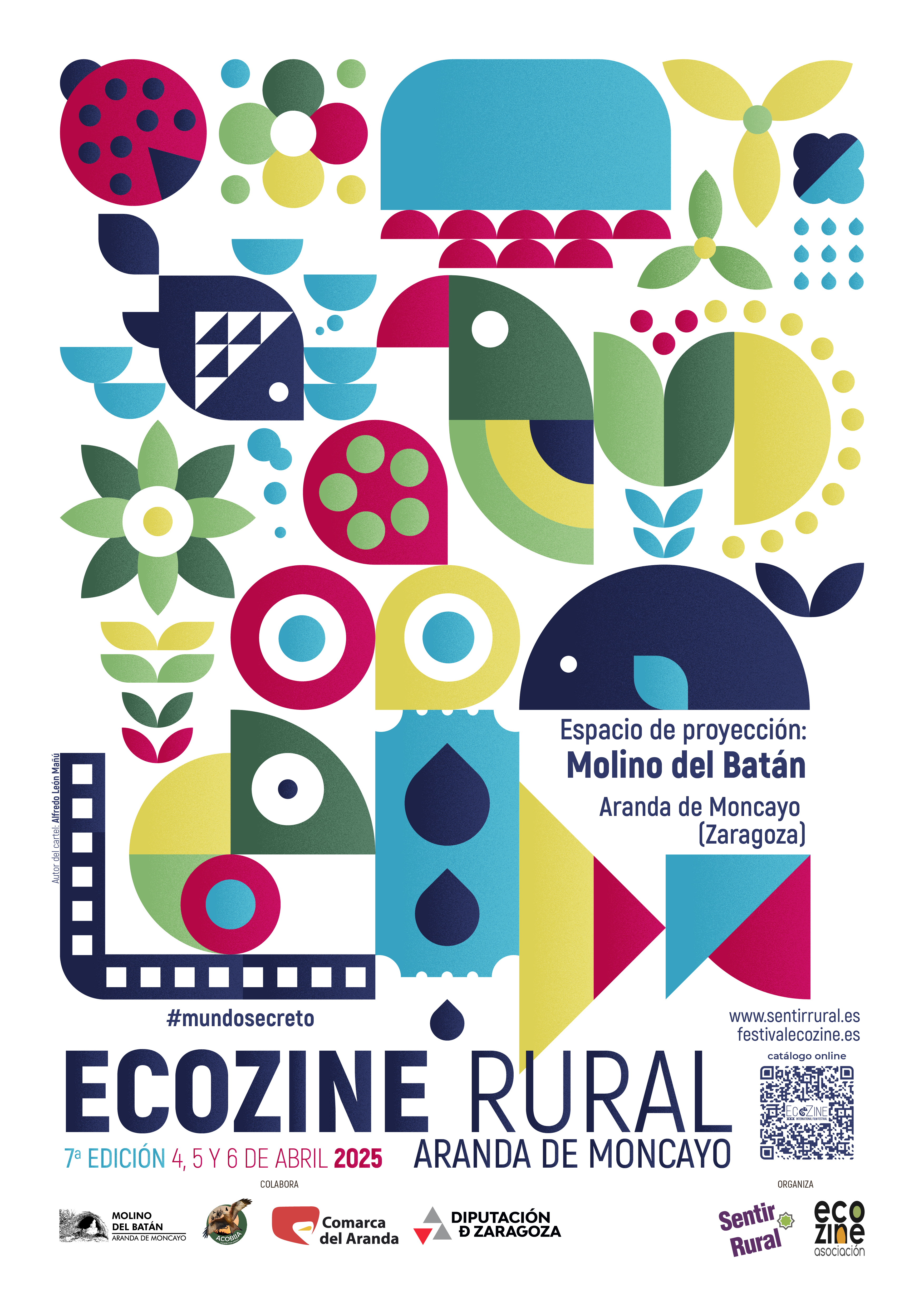CHANGE EVERYTHING SO THAT NOTHING CHANGES
For the seventh year, the Ecozine and Sentir Rural associations are teaming up to host Ecozine Rural at the Molino de Batán in Aranda de Moncayo. This is the most rural branch of the Ecozine Film Festival, which is celebrating its eighteenth edition this year.
This year, we want to reflect on the various causes that are seriously affecting our ecosystems, rivers and oceans, biodiversity, soil, air, and humans.
Over the past 70 years, our social and economic model has had a significant global impact, accelerating rapidly over the past 40 years, drastically harming biodiversity, water, the climate, and increasing poverty in every corner of the world.
Climate change, the over-extraction of natural resources, the collapse of biodiversity, the overuse of the agricultural and meat industries, the deterioration of the oceans, the pollution and mismanagement of rivers, and the increasing poverty in every country are all addressed independently, without a comprehensive view of the problem that is our socioeconomic model.
Putting the central focus on "eliminating" the carbon footprint, implementing an energy transition that requires vast amounts of fossil fuels for its implementation and installation, not to mention the destruction of the territories where they are installed, as well as on AI (Artificial Intelligence), which requires enormous amounts of energy, water, and other resources, as the solutions to all the problems the planet currently faces, is like curing the symptoms rather than treating the problem. In the short term, treating the symptoms may seem to alleviate the problem. In the long term, it will be in vain if we have not made the necessary changes and persist in maintaining a socioeconomic model based on continuous growth through extraction, exploitation, and inequality.
Perhaps the time has come to consider a socio-economic model that prioritizes quality over quantity.
Screenings and interactive discussions from Friday, April 4th to Sunday, April 6th. Four feature films and five short films will be screened. Several directors will be present.

On Friday afternoon, April 4th , we will begin with two short films: Mum's Special, which is less than 3 minutes long and is in stop motion format. Through the eyes of its director, Hong Yane Wang (of Chinese origin and who emigrated with her family to the United Kingdom), we see the amount of clothing we accumulate and the story of how her mother sewed clothes for the whole family by reusing used garments. This will be followed by Adidas ownsthereality, directed by Keil Orion Troisi and Igor Vamos, both activist artists. This short film is an elaborate denunciation of working conditions in the Adidas supply chain, focusing on the harsh conditions of garment workers.
Friday afternoon will conclude with a screening of the feature film "We Want Our Water," by Eriberto Gualinda. Through the eyes of young people, we will hear the struggles of their elders, who experienced the devastating effects of palm oil companies on their community and how they replaced the rainforest with monoculture plantations, polluting even the water in their river.
On Saturday, April 5th, we will have screenings throughout the day. We will begin with the animated short film "Si viene de la tierra" (If It Comes from the Earth), directed by Hungarian filmmaker Katalin Egely. An animated visual poem with a cumbia soundtrack, it pays homage to the land and its fruits. Next, we will screen the Valencian feature film "Llavors, van voler soterrar-nos, pero no sabien que èrem llavors" (Llavors, they will come underground, but they don't know that they are llavors) by La Cosecha Production. This work explores how urban development projects in the 1990s in the city of Valencia affected hundreds of hectares of peri-urban vegetable gardens, the alquerías (farms), which were replaced by asphalt and whose inhabitants were expropriated. After the screening, we will have Toni Silva, from La Cosecha Production, for an open discussion.
In the afternoon , we will screen the black and white animated short film Martha, a silent documentary from the 1910s based on real events, rescued and restored in 2024 by Marcel Berelli. The story narrates the life of the most abundant bird on Earth and how it was exterminated in just a few decades. Followed by Francisco Vaquero's new work, Vidas irrenovables (Nature or Misery). This documentary reflects on how the transition from fossil-fuel-based energy sources to renewable energy is destroying ecosystems, economies, and societies in rural Spain. What was originally conceived as a solution to save the environment and revitalize towns is paradoxically having the opposite effect. After the screening, a discussion with the director will take place.
The seventh edition concludes on Sunday morning, April 6 , with the short film Djami, by Iranian director Nazanin Chitsazi. It tells the story of a boy who collects wasted water. What's the point? The film will then be screened, followed by the feature film Montañas en Harmonía, by Francisco Javier Fernández Bordonad. After the screening, there will be a panel discussion with the director, and we'll also feature the Canal Roya platform, which is featured in the film.
Finally, we will finish with a guided tour of our territory with Acobija Conservación, where we will discover its natural beauty and its pastoral architecture, including vestiges of the Celtiberian period.
Information:
Contact: Sentir Rural 610624503









